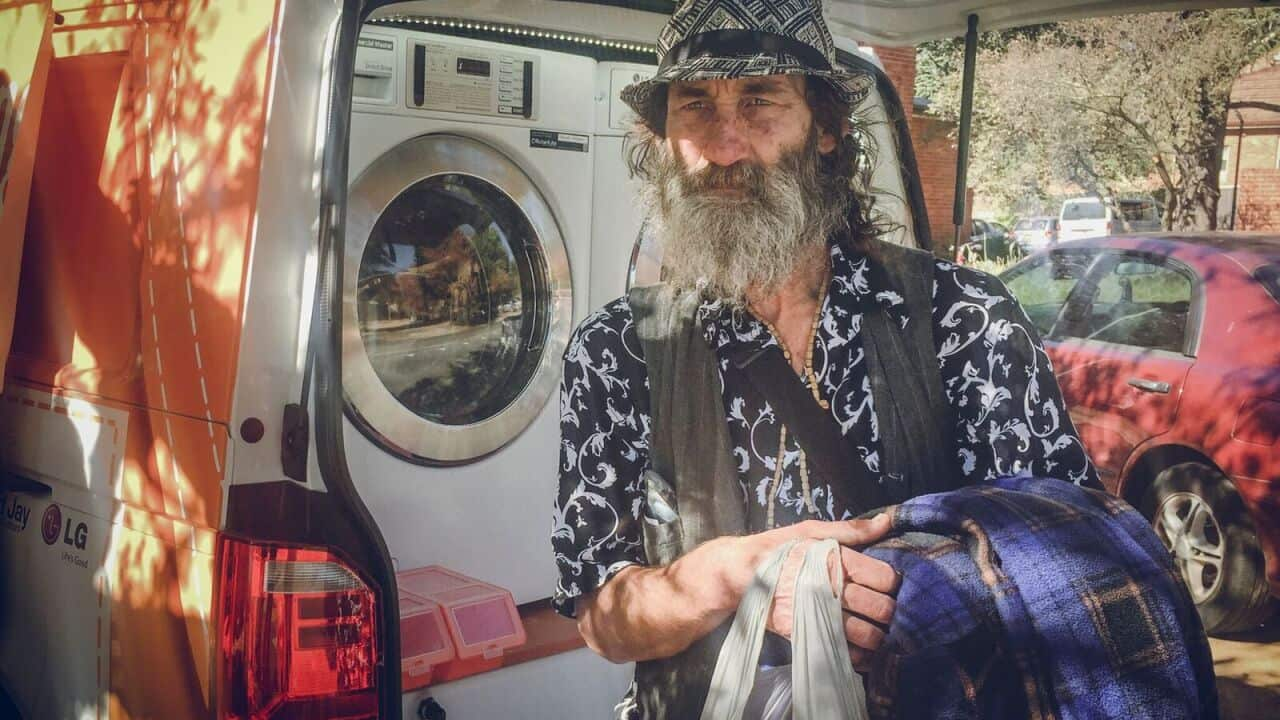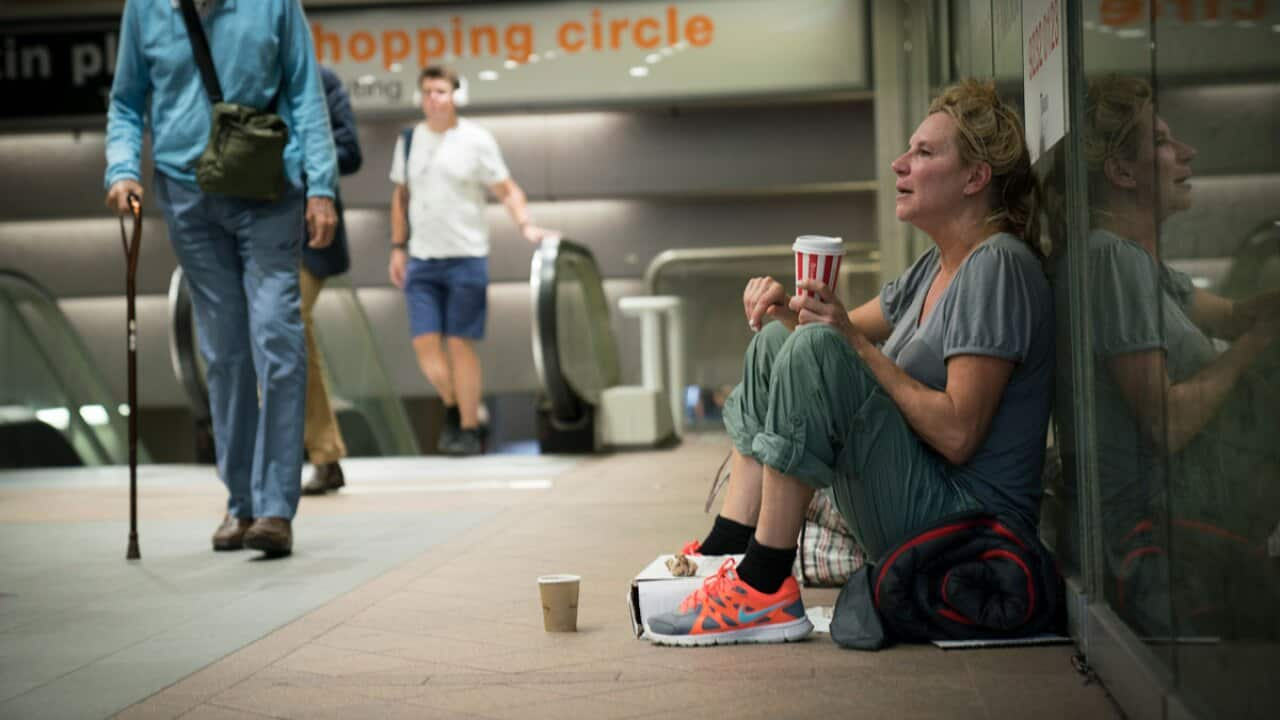

Feature
Six legs in a sleeping bag
The animals that accompany Melbourne’s homeless are a lifeline, worth all the challenges that having a pet brings to life on the streets.
Published
Updated
Jade and Murphy
Jade has had a lot of dog companions, but Murphy, her 12-year-old English Staffy, is something different.
“He’s everything,” the 39-year-old says, taking a break from her patch in Melbourne’s city centre to exercise him on the banks of the Yarra. “I think he thinks I’m his missus, to be honest with you.”

Murphy has saved Jade’s life from assailants three times. On one of those occasions, the dog copped two stab wounds to the chest.
“Those two weeks without him on the streets were the hardest two weeks I’ve ever done,” says Jade. “I slept on the park bench outside Lort Smith [Animal Hospital], waiting for him.”
He’s everything...I think he thinks I’m his missus, to be honest with you.
Animal companions of the homeless, who sometimes have to prove their loyalty in heroic deeds, might not recognise that their human friends are also making a huge sacrifice. It’s a kind of catch-22: taking on a pet to make life on the street more bearable, sharply decreases the chances of finding crisis shelter or long-term accommodation.
Murphy has been accredited as an emotional support dog. This allows Jade to take him on trams, in shops, and to hotels when she can afford them, but she’s still failing to find public housing.
It’s a predicament she’s keen to make more widely known, swearing to advocate for other homeless people and their pets if her own situation should improve.
“Cancer patients are told to get drugs for their health, but I have to give mine away?”
Mick and Beau
Also sleeping rough in Melbourne is Mick and his dingo Beau. By day, they keep each other company. At night they huddle together for warmth.
As a street sweeper trundles past. Beau leaps to his feet, at the ready.
Emma and Jessie
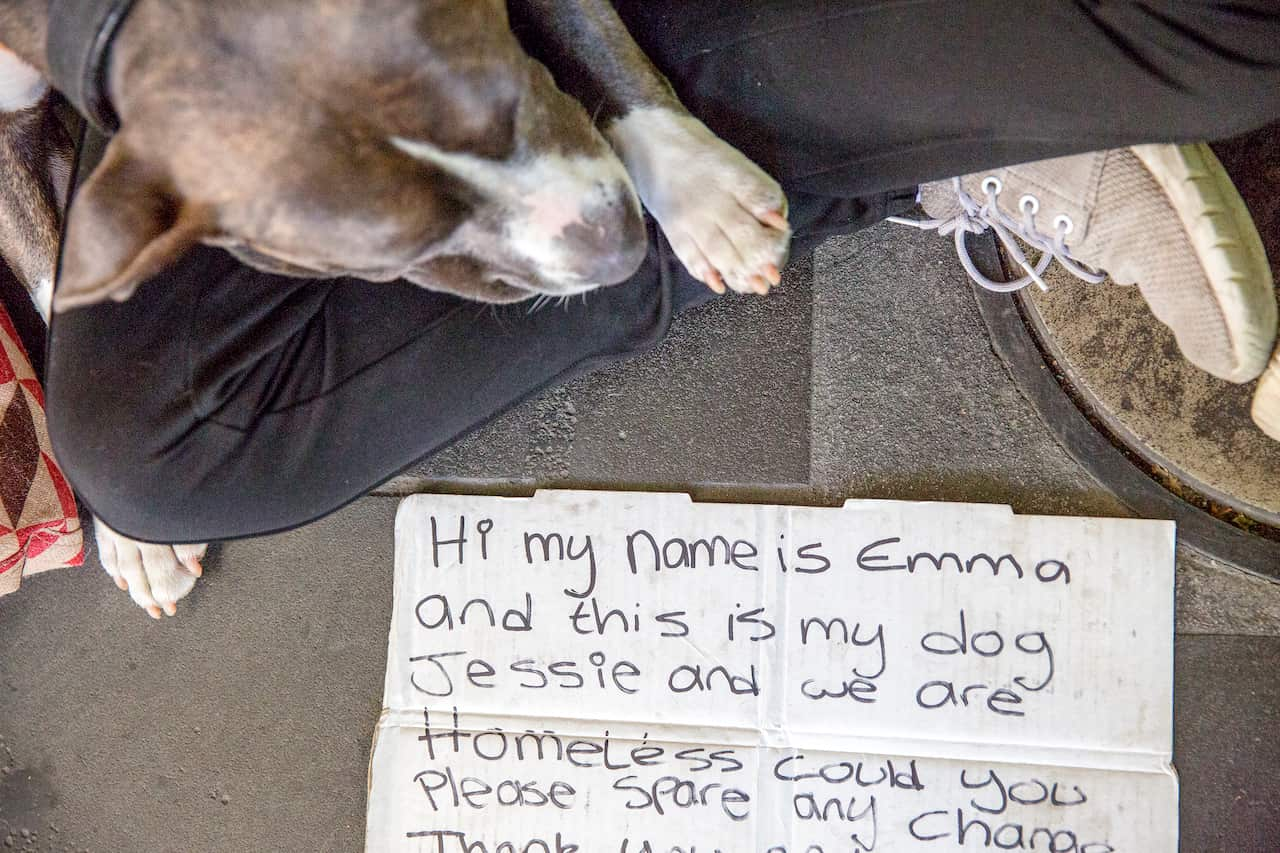
Teenager Emma sleeps rough too, with her dog Jessie. Her cardboard sign introduces the two of them and asks if any change can be spared. Emma has made sure Jessie is well-equipped, with a big bone, a dog blanket, bowl and leash.
The only such luxury for Emma is a well-thumbed copy of Fifty Shades of Grey. “Someone gave it to me,” she says.
Finding a place to live with a pet in tow is a Herculean struggle, rife with appointments and paperwork.
Few crisis shelters accept pets, and even fewer hotels. Longer term, it’s even tougher. Finding a rental property that will accept pets is difficult enough even for those with a job, a bond and solid references.
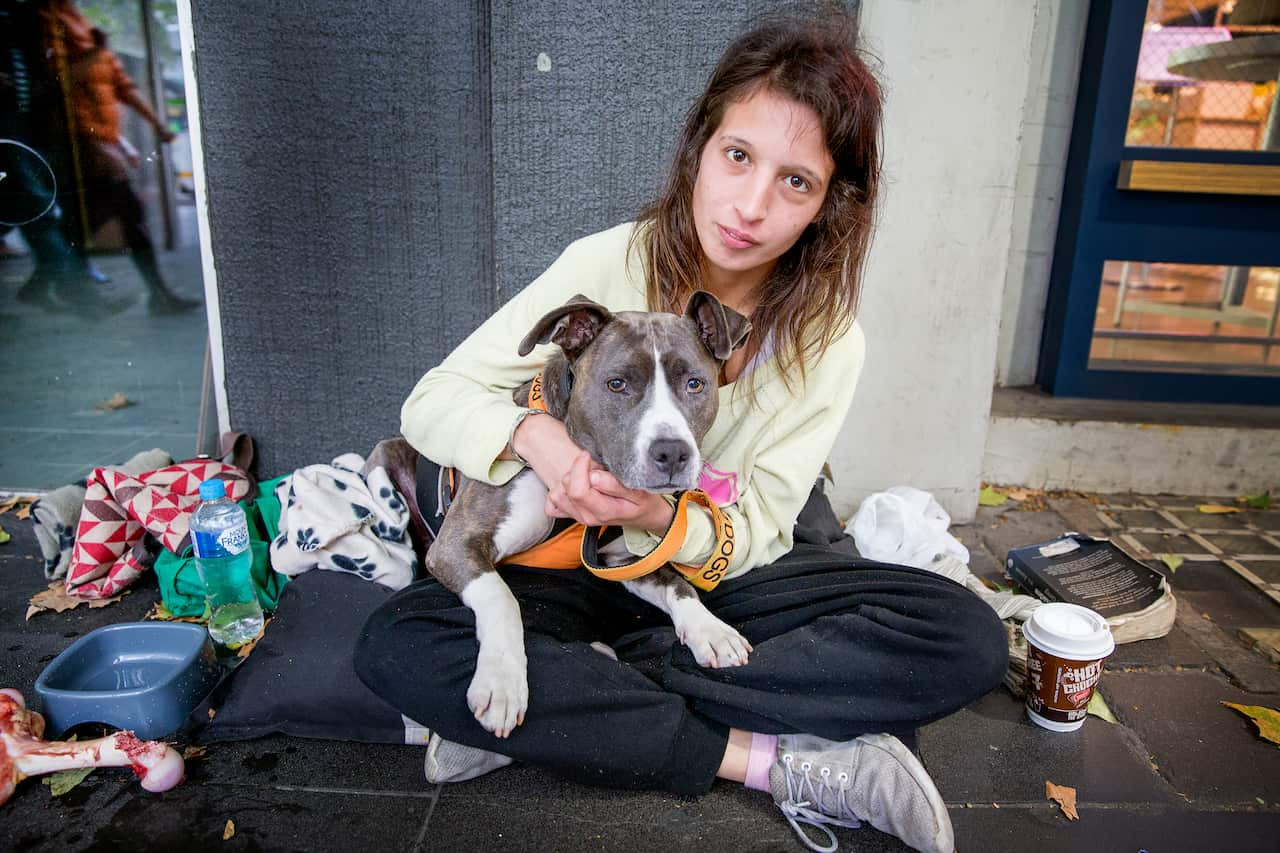
In Victoria, there are long waiting lists for public housing. While pets are allowed within council guidelines, there’s paperwork required, including consent from the Office of Housing.
And not all pets are small enough to smuggle.
Temporarily giving up a pet for fostering is an option, but separation is an incredibly distressing prospect. As Jade says, her dog is so used to having to protect her from strangers that she can’t guarantee how well he’d settle with someone else anyway.
Lort Smith Animal Hospital in North Melbourne, provides free or subsidised veterinary care to those in need, and there are organisations that take public donations and redistribute food, toys and treats to pet-owners who are living on the streets.
We need to factor in and respect the value of animals, which offer people companionship, support and responsibility. We need to make pets part of our homelessness service.
Victoria’s Pets of the Homeless distributes pet supplies and provides veterinary care and an outreach service. Its founder, Yvonne Hong, believes broad changes in policy are needed.
“We need to factor in and respect the value of animals, which offer people companionship, support and responsibility,” she says. “We need to make pets part of our homelessness service.”
READ MORE

Can homelessness ever be solved?
Danny, Kendra and their pet rats
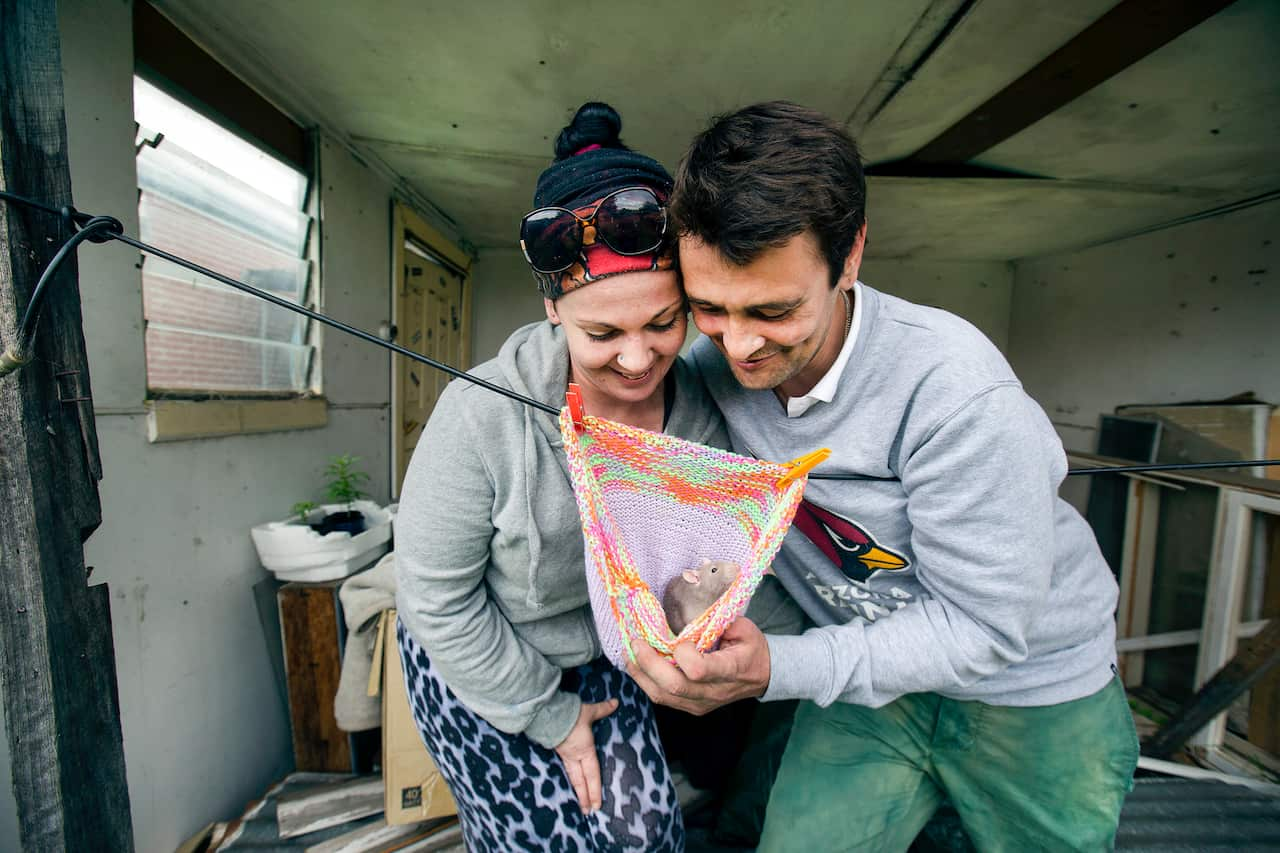
Danny and Kendra would take their pet rats everywhere, with Kendra even dying the rats’ tails blue to match her hair.
But now, Danny’s largely lost touch with the others and has been seeking temporary shelter from organisations supporting men seeking housing.
Summer and Princess
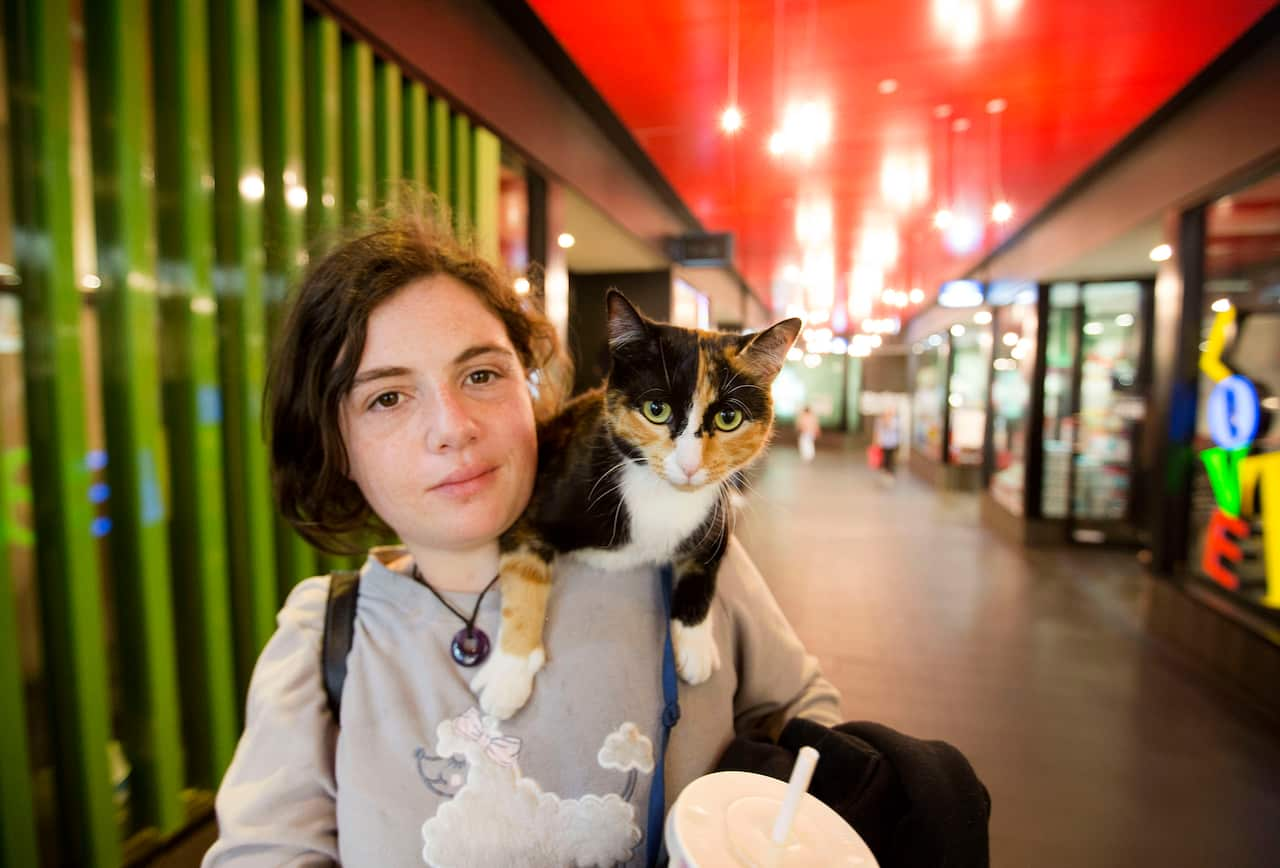
By day, Princess plays at Summer’s feet, chases birds in a local park, or rides on her shoulder. Tonight the pair will share a swag in an alleyway, or, if Summer makes enough money, she’ll sneak Princess into a hotel. They’ve both become adept at disappearing from view when they need to.
The night Summer found her kitten, she felt that life was hopeless. Then she spotted Princess, just one week old, mewing in an alleyway with her eyes still sealed shut. Summer fretted that if she took the kitten to a pound it would be put down because of its young age.
“I knew that I had to look after her and keep her going in life,” says Summer. “She’s now my best friend because of it.”
As Summer talks, a woman stops and points down at her. “I don’t want to interrupt, darling, but I just lost my cat on Saturday, I had to have her put to sleep,” the woman says.
“She looked all right to me, but she wasn’t. Her heart was racing and her breathing was shallow. She looked well, but they need to stretch their legs a lot.”
“Yeah, I know,” says Summer. She’s well used to fielding welfare questions. “She goes to a park and that.”
Well, it doesn’t matter how old they are. They get sick like we do.
The woman regards Princess dubiously. “She’s moving around a bit, so that’s good. They’ve got to stretch their muscles. How old’s this one?”
“A year,” Summer says.
“Well, it doesn’t matter how old they are. They get sick like we do.”
Over the course of 20 minutes, two other women stop. One urges her to get her life back on track, the other tells Summer she’s “too young to be doing this”.
When they are all out of earshot, Summer says: “I figure that they mean well, they just don’t understand how hard it is to be in my position, you know?”
Public perception is its own battle
In March 2016, a Melbourne newspaper ran a story about homeless people exploiting their pets as ‘props’ for money. Jade certainly took notice of that article, because in its wake there was an increase in public aggression about her decision to keep Murphy by her side.
“There is an influx of these fly-by-nighters over the weekend, who then go home to their warm beds,” she says.
“They’re the people who make it difficult for me and Murphy to survive. We’re all tainted with the same brush. But if people haven’t got the time to ask me my story, then how do they find the time to judge me?”
Many animals, especially dogs, don’t actually need that human construct of a roof. What they need is attention, stimulation and affection, which homeless owners can often offer more of than owners with houses.
Yvonne Hong from Pets of the Homeless feels equally strongly. “Being disadvantaged doesn't make for neglectful pet owners, just as privilege doesn't guarantee animals a kind and loving home,” she says.
“Many animals, especially dogs, don’t actually need that human construct of a roof. What they need is attention, stimulation and affection, which homeless owners can often offer more of than owners with houses.”
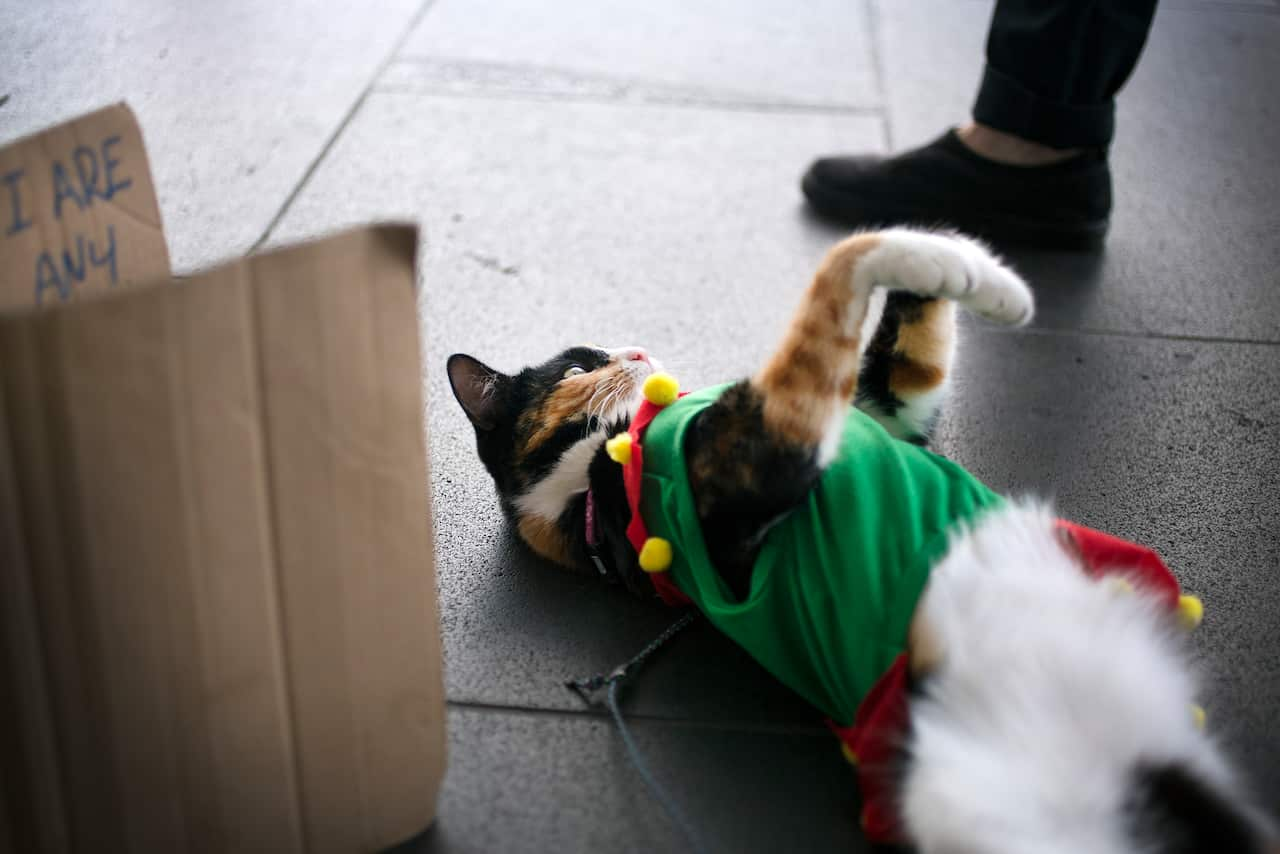
All afternoon, Princess has played at Summer’s feet, with a break to chase birds in a local park. Now Summer is packing up for the day, and the cat will ride on Summer’s shoulder to the alleyway they share.
“She helps me just by being here with me, you know?” Summer says.
Experience homelessness with 'Filthy Rich and Homeless'
Filthy Rich and Homeless is a new three-part documentary series exploring the experience of being homelessness. It involves five wealthy participants who volunteer to give up their riches and comfort for a life on the streets for 10 days. What unfolds is fascinating and inspirational.
Watch episode one of 'Filthy Rich and Homeless' on SBS On Demand below.
If this article has raised issues for you and you would like to talk to someone, please call Lifeline on 13 11 14 or visit their website by clicking here. For information about services from St Vincent De Paul, click here or for services offered by Salvation Army, click here.


